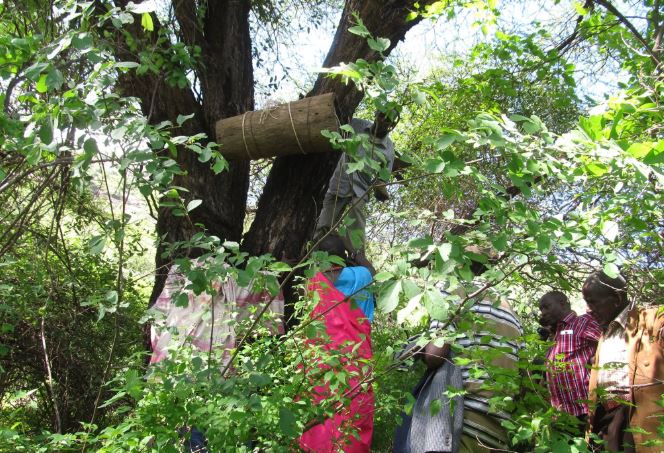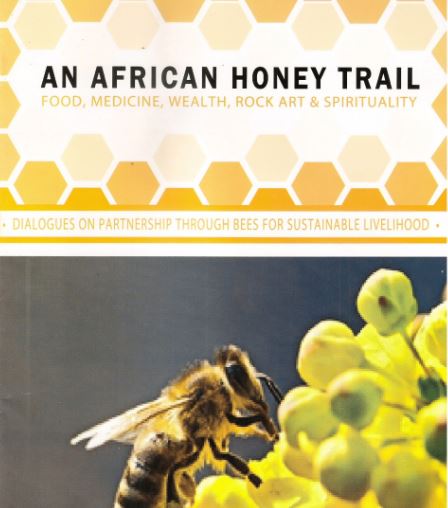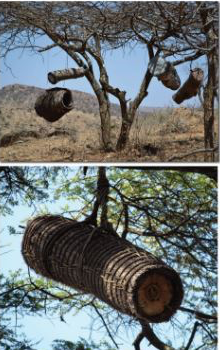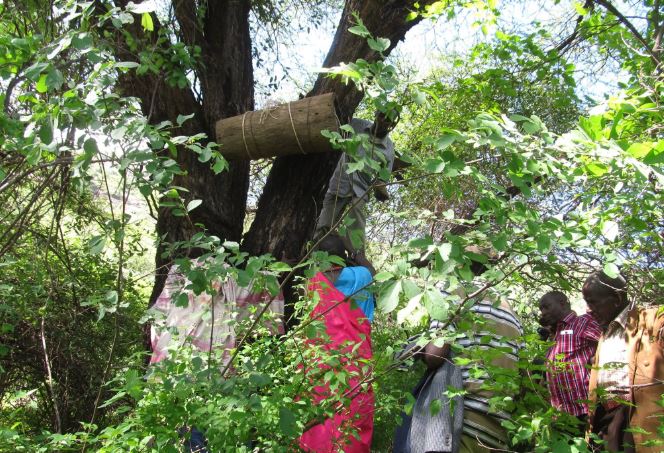
Bees, like farmers all over the planet, are struggling with the onslaught of drought and extreme climatic changes. Additionally, deforestation, use of agricultural pesticides, pests, and diseases have contributed to an alarming decrease in the bee population that discourages beekeepers from pursuing this occupation.
In Kenya, Africa, communities of the Borana, Gabra, Samburu, Ameru, and Agikuyu peoples in the Mt. Kenya region were engaged by the Porini Welfare Association to promote the use and application of indigenous apicultural knowledge systems and traditional and contemporary practices to safeguard the natural heritage of the sacred montane forests of the northern desert of Kenya through beekeeping.
Before they embarked on their journey, they held rituals to seek blessings and guidance from the great Diviner for the intercultural exchanges that were to be conducted among the Mt. Kenya Region peoples – ten upstream and downstream communities along the African honey trail. Indigenous farmers and pastoralists became more aware of the significance of the bee’s pollination services and their role in the people’s survival and their biodiversity. In particular, Samburu elders agreed to include bees in their prayers when they pray for their livestock and community survival and prosperity.

Dialogues on indigenous knowledge and technologies regarding the bee were documented. This was only the beginning, as more knowledge holders emerged and were willing to participate in the conversations. Intercultural exchanges were abuzz with cosmoviews, stories, and indigenous technologies on apiculture.
Apicultural knowledge and its role was shared and revitalized, and about forty beehives in the ten honey trail communities were installed to initially encourage people to embrace the bee. The piloting of bamboo and cow dung hives in all the ten communities was done as part of a social entrepreneurship programme for more bee custodians. Women who have traditionally shied away from beekeeping were encouraged to participate and were assured that there were no taboos preventing them except when harvesting honey for specific ritual purposes. So much more needs to be done, and they expect to install more beehives to increase the population of bees and their diversity.
A multilingual booklet was published and shared among the communities to deepen knowledge and foster intergenerational learning. The booklets were distributed in at least four schools where apicultural clubs were established, stirring greater interest in and appreciation of apiculture.

Social media fora were tapped, including a Facebook page to engage wider indigenous and non- indigenous audiences. “An African Honey Trail” is valuable publication that has been shared widely, attracting more information and feedback. The website www.poriniassociationkenya.wordpress.com hopes to catalyse wider action. Attendance at the Kalacha Festival was an opportunity to share the need to embrace and venerate the bee for the tribes’ posterity and for biodiversity.
Travel to the Sauti Ya Nyuki communities for dialogues posed challenges and required a lot more time and patience. Availability of knowledge holders also demanded flexibility and adjustments and provided different levels of interpretation and corroboration of information.
Despite all the challenges, there have been great strides in the identification of more sustainable beehives. There were also collaborative efforts with Ethiopians to develop a training programme and exchange bamboo beehives indigenous technology. The Ministry of Environment has expressed an interest in collaboration and PORINI welcomes the possibilities.

The longer-term vision targets one million beehives installed by 2019 within the SAUTI YA NYUKI communities, especially in the Northern Montane areas where the acacia flora is abundant and the zone relatively free of agro-chemicals resulting in wild, organic, high-quality honey. There was good momentum, and the communities regard it as a great blessing when a beehive is occupied after traditional rituals are conducted. They have begun to harvest the honey and experiment with beeswax balm, milking balm, and candles to diversify livelihood options and to establish closer relations with their biodiversity.
The ‘SAUTI YA NYUKI’ project – THE CALL OF THE BEE – deeply resonated with communities who realized that bees are declining in other parts of the world and farmers and pastoralists must come together and safeguard their bees in East Africa. Communities also realized that honey is only as good as the biodiversity the bees feed upon, and thus it is critical to safeguard the flora and water catchment areas. Communities have awoken to the fact that the bee has been around for more than a hundred million years and will continue to be part of the people’s culture and survival.
The project ‘SAUTI YA NYUKI’ – The Call of the Bee was implemented by the PORINI WELFARE ASSOCIATION in Kenya in December, 2016 with the support of PAWANKA Fund.

